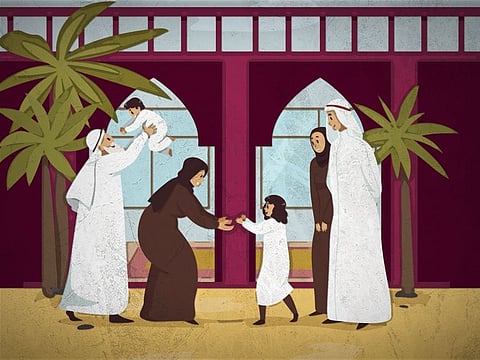We got our ‘in person’ Eid back
Pandemic showed us how easily we could lose things that we had taken for granted

This is the first ‘in- person’ Eid in three years. The past two ones were celebrated ‘virtually’. This time we will get to see, embrace, and share the traditional breakfast with our loved ones, finally.
I wrote on May 23, 2020, ‘Don’t let the coronavirus kill the Eid spirit’, lamenting the way the holiest and happiest day in the Islamic calendar was reduced to a social media event, where one sends and receives greetings via WhatsApp and talks to family on Zoom.
I wrote: “Today, as we shelter at home to fend off the vicious virus, it is one for the records. History will record that in the year 2020, Eid was muted. People avoided shaking hands with their neighbours.
Eid congregations in the mosques, which for most is the highlight of the day, were cancelled, and the otherwise packed malls were quiet. Children playgrounds in the city were closed and cinemas and restaurants were off limits.”
Unbelievable, isn’t it? Absolutely. Although we have lived it, I still cannot believe it. It was painful. But we are back. The ‘normal’ Eid is back.
The end of the pandemic is not even close, experts at the World Health Organisation (WHO) say. They point at the rising numbers of Covid-19 infections in many countries as evidence that the virus is far from over. Shanghai, China’s business hub, continues to be locked down.
World’s entire supply chain
I saw an incredible satellite image of hundreds, perhaps thousands of cargo ships waiting outside the city’s port as its staff remain under lockdown. That took care of the world’s entire supply chain. Gone. In the capital Beijing, schools have been closed as the number of cases show significant increase in the country where it all began.
In the United States, “coronavirus cases and hospitalisation are rising in a majority of American states, in what appears to be the first widespread increase since the peak of the Omicron surge in January,” according to the New York Times. Cases are up more than 50 per cent from two weeks ago, and hospitalisation are up 4 per cent.
These two countries represent the backbone of the global economy. They together account for more than 25 per cent of the world’s GDP. So, if it gets cloudier there, it will pour down on all of us out there.
The Shanghai lockdown has already spooked investors and cost corporate giants, like Amazon and Apple, tens of billions of losses in the past few days.
Surprising data last week showed the US economy had shrunk in the last quarter, the first decline since 2020, as the GDP fell at a 1.4 per cent, further fuelling fears of an impending recession, economists say.
In addition to the stubborn virus, which I doubt will leave us ever, the war in Ukraine has added significantly to the worries. Mammoth sanctions on Russia by the West, the likes of which never seen before, have led to a historic rise in commodity prices, driving up inflation across the world.
Food and fuel prices have doubled in some countries. Analysts expect political upheavals in some developing countries as essential goods have become out of the reach of ordinary people, let alone the poorer segments in those societies.
Sri Lanka was just the first in more to come, they predict. Sri Lanka has recently seen widespread violent protests after enduring lengthy blackouts and acute shortages of food, fuel and pharmaceuticals for months. On Friday, the government hiked medicine prices by a whopping 40 per cent!
Gruelling conditions worldwide
Nevertheless, and despite all the Covid-19 related bad news, Eid, as we know it, is back. People will be praying together, having breakfast together and the malls will surely be packed. In two years of gruelling conditions worldwide, we have proven to be far more resilient than we had thought.
At one point during the height of the pandemic, it seemed so unrealistic to expect that life will return to normality after what we have been through. Sure, there are social habits and some parts of our traditional way of life that will never come back. And some new ones, such as social distancing, that will remain with us for years to come, and perhaps forever.
In that context, the pandemic was an eye opener. It showed us how we could easily lose things that we had taken for granted all our lives.
Small, simple things like having coffee with your friends at a coffee shop, talking to people in the elevator, going to the movies, or just window shopping at the mall. As we dust off the social effects of the virus, I for one look at those simple things differently now. I began to cherish those little things.
One of the things that we had taken for granted in Eid, until we almost lost it couple of years ago. The thought of losing the Eid, the same way we lost some of the other social norms, is a freighting thought. I look at the Eid in a whole different way today. And you should too.
The best things of the Eid, and indeed its greatest joy is sharing. One of the ways to cherish it is to see an Eid smile on the face of those less fortunate. We are lucky to get our Eid back, ‘in person’. Sharing the blessings will ensure that it will always come back with more joy and happiness. Eid Mubarak.


